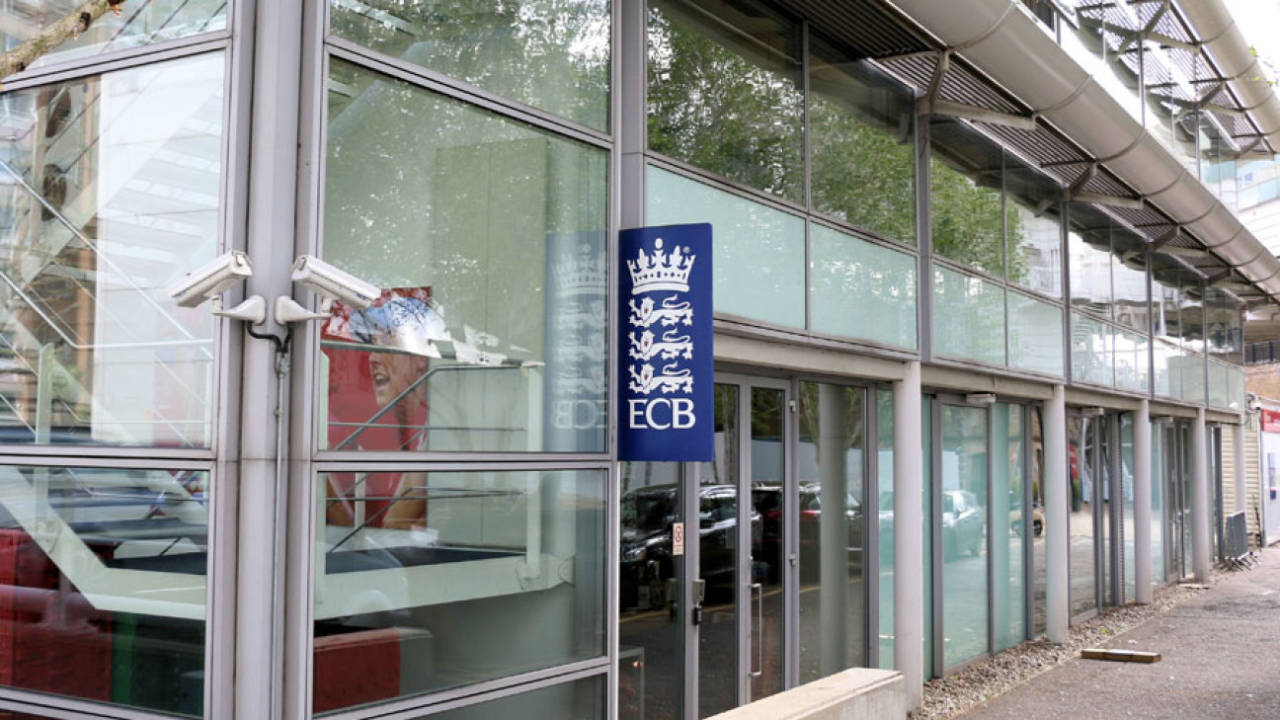Nash resigns from ECB board in protest at Test-county payments
ECB's standards of corporate governance 'fall well short of what's acceptable', says former Somerset chairman
George Dobell
07-Mar-2018
External view of the ECB offices at Lord's • ESPNcricinfo Ltd
A county chief executive has called for an independent inquiry into the ECB's decision to make payments to Test-hosting grounds, in the wake of the resignation from the ECB Board of Andy Nash, the former Somerset chairman, who cited standards of corporate governance which "fall well short of what's acceptable".
Nash, once tipped as a potential successor to Colin Graves as ECB chairman, was responding to revelations - published by The Times in recent days - that several Test-hosting counties will receive large payments (understood to be GBP500,000 a year) in years they do not host Tests. These payments, Nash alleges, were agreed without the ECB board's approval or even knowledge.
As a former Somerset chairman, Nash was alarmed that the payments would marginalise the 10 non-Test hosting clubs and "clearly signals to many a move to promote eight counties as the first among equals".
It is not hard to understand Nash's concerns. In recent days Hampshire - a club who will benefit significantly from the arrangement - have announced the signing of Sam Northeast in the face of substantial opposition from other counties. Kent, Northeast's club since his schooldays, will not benefit from the payments. Is it fair, Nash asks, for such counties to be disadvantaged in these situations? Equally, is it fair that a club such as Glamorgan - that has seen loans of public money written off and has a modest record of producing England players - is rewarded with extra funds?
It is also understood that Nash's attempts to raise his concerns in recent days have been most unwelcome to members of the ECB executive - especially Graves - and he therefore came to the conclusion that he could serve no further purpose on the board.
"I hereby resign with immediate effect from the ECB Board," Nash wrote in a letter to Graves.
"I've recently become concerned that the standards of Corporate Governance at ECB are falling well short of what's acceptable and in all conscience I can't allow myself to continue to be associated with it.
"I would be failing in my duty as a director if I didn't bring these to the Board's attention and this I've tried to do. The current fiasco over the actual / alleged / planned payments to TMGs is an exemplar. Whether intentional or not it clearly signals to many a move to promote 8 Counties as the first among equals. As an ardent supporter of the 18 FCCs this is not a direction of travel I can live with.
"It's also come to my attention in the last 24 hours that my actions as a listening and conscientious NXD are sadly misunderstood and misinterpreted by yourself. I sincerely regret that because all I want is the best for the game and for good governance of the ECB.
"I wish English cricket every future success: it's been an enormous privilege to serve this great game as a County Chairman and ECB Board Director since 2004."
At this stage, the resignation is only an embarrassment to an ECB executive that have talked a good game about corporate governance - Tom Harrison, the chief executive, even used it as mitigation for Ashes defeat. But it has the potential to become much more serious.
In the event of an independent inquiry, one obvious area of interest would be the on-going situation whereby Yorkshire, who fared well both in major match allocations and in terms of being awarded the right to host one of the new T20 teams, owe family trusts set up by Graves over GBP20 million. Those Grave trusts also retain a right of veto over who joins or leaves the Yorkshire board.
Graves, it might be remembered, left the room when the ECB Board approved the recent major match allocations, as he accepted there was the possibility of a perception of conflict of interest. But did he leave the room when Durham were stripped of their Test status, or when the chairman's meeting rejected the ECB's own working-party recommendation into a future T20 competition featuring promotion and relegation rather than the new-team version?
There may also be scrutiny of a letter, signed by Graves and sent to Somerset, at a time when the club was faltering in their support of the new-team competition. In the letter, Graves seems to imply that Somerset would be well placed as a future host of one of the new teams, though they subsequently missed out on that opportunity. ESPNcricinfo understands that Somerset did briefly consider a legal challenge to that decision but have been assured they will be better served, in the long term, if they accept their fate.
And that may be considered the nub of the problem. For too long, deals have been conducted out of sight and scrutiny. For too long, counties have been forced into acquiescence by offers of patronage or fears of retribution. The ECB, who insisted on non-disclosure agreements during the debate over the future direction of domestic T20, has now reacted to recent negative publicity by threatening to report anyone suspected of 'leaking' information to the media to their new regulatory committee designed to uphold standards of integrity. Does that sound like an organisation that welcomes scrutiny and openness?
Nash had served as a board member and county chairman for more than a decade but this act, bringing to light the high-handed management of the game, may prove to be his most influential moment.
George Dobell is a senior correspondent at ESPNcricinfo
